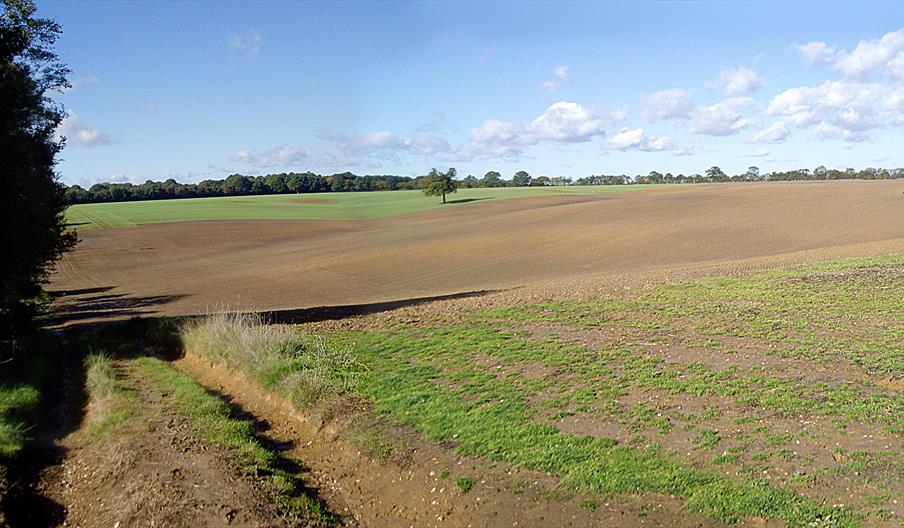Book Tickets Online
About
Discover the Essex Way online on this page - join John Rogers as he walks the first part of the route through our district. Find other walks and fascinating videos and online content HERE.
The Essex Way is a long-distance path stretching from Epping to Harwich a distance of 81 miles. You can walk it in stages, or make a holiday of it staying in accommodation along the way. Along the route there are waymarks posts to help you.
The Essex Way was conceived as the result of a competition funded by the Campaign for the Protection of Rural England (CPRE) in 1972. It has quickly been accepted into the fabric of the county and become folklore for future generations.
Here are some of the places the Essex Way passes as it journeys through the Epping Forest District. You can join the Essex Way at any point and various other paths and marked ways cross it.
Epping
Epping is the last stop on the Central Line of the London Underground system which makes it ideal for beginning the Essex Way from London. A market town, Epping has plenty of shops and places to eat and drink.
Gernon Bushes
79 acres of ancient woodland containing hornbeam pollards and mossy bogs managed by Essex Wildlife Trust. Pollarding has been practised since at least Anglo-Saxon times. About every 15 years the trees would be cut to a height of 2 - 5 metres. The lopped-off branches would be used for fencing and fuel, and new shoots would sprout beyond the reach of grazing cattle and deer.
Roman Road
The Essex Way crosses the line of the Roman Road from London to Colchester. Wild hops growing along the hedgerow are descendants of the once nearby Roman hop fields. Just to the north lay a centrally-heated Roman villa and a farm with a round oyster pond.
Toot Hill
It is no surprise to find that Toot Hill means ‘lookout post’. The pub at Toot Hill is the Green Man. The face in the leaves is also known as Jack in the Green, the Old Man in the Woods, or Green George. He has been a symbol of fertility and renewal since pagan times, appearing in churches and cathedrals. He is the central character in traditional Morris dances.
Greensted
Greensted is famous for its ancient Saxon church, believed to be the oldest wooden church in the world, about 645 AD. The nave, made from split oak logs, was added 200 years later. Dendro magnetic testing established a date of AD 845. The rear wall contains a ‘leper’s squint’, a small hole where a cup of holy water was placed for lepers who could not attend the services with other worshippers. To the right of the porch is the grave of the unknown Crusader. Legend states that the body of St Edmund, martyred in 870 AD, was rested at Greensted Church while being transported from London back to Bury in 1013. His body had been taken to London to keep it safe from the Danes. In 1836 several of the ‘Tolpuddle Martyrs’ were temporarily settled in Greensted following their full pardon and rescue from transportation to Australia. Two of them were married in Greensted Church. Distrusted by farmers as troublemakers, the ‘Martyrs’ soon left to start new lives in Canada.
Ongar
Ongar is a historic market town with places to eat and drink. Ongar Castle is thought to have been constructed by Richard de Lucy in 1155 after he inherited the Manor of Ongar from King Stephen’s estate. He secured a ‘chipping’ (a market) surrounding the castle for the people of Ongar. The impressive castle mound (motte) is about 55 feet high and would have had a wooden tower on top. The town would also have been protected by an outer earthwork.
Ongar Church is dedicated to St Martin, a Roman soldier who became a Christian Bishop. Built around 1080 out of flint rubble and re-used Roman bricks. The most interesting feature of the church is the ‘ankar-hold’ in the north wall of the chancel. This was a hole in the outside wall where a hermit could take part in the church services without being seen.
River Roding
Part of the walk is beside the River Roding which begins at Marshall Green near Stansted Airport and flows south to the Thames at Barking Creek, 3 miles downstream of the Thames Barrier at Greenwich – a journey of 43 miles.
Willingale Airfield
Built between June 1943 and July 1944 Willingale was home for 2000 American air force personnel attached 287th Bomb Group which flew B26 Martin Marauder bombers against targets in occupied France. All that remains today are the Operations Block and Nissen huts.
Willingale Chuches
Willingale is unique in Essex for having two churches in one churchyard – St Andrew’s and St Christopher’s. One popular local legend tells how the whole of the village lands were held by two sisters, who fell out one day over where they sat in their pew. One sister determined never to sit near the other again, so, being very rich, she built her own church next door. This tale is undermined somewhat by the fact that there is 200 years age difference between the churches. The churches were actually built in two separate parishes, Willingale Doe and Willingale Spain. In wartime, the American airman and crew used St Andrews as their chapel. The Bell pub (now a private house) would ring with the sounds of American dance music when the young airmen enjoyed a few hours relaxation between missions at dances and parties held by locals.
Facilities
Parking & Transport
- Parking (charge) - There are car parks at Epping Station, in Epping Town and in Ongar Town.
- Parking (free) - There is free car parking at various locations where the Essex Way crosses through or near villages.
- Railway station within walking distance - The Essex Way starts at Epping Station. Epping is the last stop on the Central Line.
Provider Preferences
- Countryside Setting
- Forest Location - The Essex Way passes through wooded areas.
- In countryside - The Essex Way passes through varied countryside.
- In town/city centre - The Essex Way starts at Epping and passes through Ongar.
- Outdoor Attraction
- Village Location - The Essex Way passes through or by the villages of Coopersale, North Weald, Greensted and Willingale.
Specialist Features
- Easy Route
- Family Fun
- Marketed Towards Families
- Marketed Towards Senior Citizens
- Marketed towards student/youth
Map & Directions
Road Directions
There are car parks at Epping Station and Ongar.
Public Transport Directions
Join the Essex Way at any point. Travelling to Epping Station on the Central Line is an ideal way to start your walk. Buses can take you to and from Ongar if you wish to walk one way and take transport back. The Essex Way crosses roads at Coopersale, Toot Hill, Greensted, Ongar and Willingale so all of these points are ideal put-down or pick-up points.











